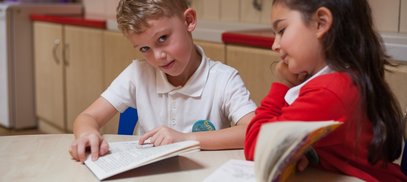You’ve no doubt heard the phrase ‘get lost in a good book’. You may well have used the phrase to describe a reading experience or habit of your own. There are so many ways to get lost in a different world or escape your everyday when you are reading a book.
It might be the unrelenting grip of a thrilling plot. It could be the sheer sweep of emotions in a tale of high drama. It could, when the writing is especially strong, be the magical transportation that can happen when you connect very deeply with the experiences of a well-drawn character. Sometimes this may sit at the level of deep sympathy, but when the conditions are right, it could be a shift of an empathic kind.
As we look to understand the relationship between reading for enjoyment and empathy, it’s worth considering how we might support those conditions in our classrooms or if you're reading at home with your child. We know that building empathy carries all kinds of benefits. We also know, from recent research around reading habits and enjoyment, that there is a correlation between reading for pleasure and the development of attributes like empathy.
Why does empathy matter?
Our friends at EmpathyLab lead the way to offer support as we try to understand and nurture empathy in the classroom and at home.
It’s worth drawing out some of the key findings and benefits shared, just so we’re clear why this is worthy of classroom attention or time together at home when time pressures are running high.
- A key consideration for educators is that empathy is a learnable skill. Better still, in our view, is that reading is a powerful vehicle for its development. Each year, Empathy Lab offer the Read for Empathy collection. These are expertly selected reading lists that spotlight books for 3 to 16-year-olds and are especially suitable for the kind of reading which is conducive to empathic development.
- Empathy can foster children’s well-being and resilience, and it hardly needs saying that this is a critically important consideration given the challenges of recent years.
- Empathy as a pathway to attainment. Furthermore, research shows that the emotional and social benefits of empathy are more significant for young people’s academic attainment than IQ.
There is a brilliant research section on Empathy Lab's website which is a great place to find out more about what empathy is and the evidence base around why empathy matters.
We also have some insights of our own to share, drawn from findings from our latest Annual Literacy Survey this year.
National Literacy Trust research: reading for pleasure and empathy
Our 2024 reading research report was the culmination of insights from the responses to our 2024 Annual Literacy Survey. The National Literacy Trust research team examined 11 different motivations for reading, grouped in three categories:
- the curious reader
- the mindful reader, and
- the social reader
Key findings taken from the responses of 76,131 children and young people aged 8 to 18 demonstrate connections between empathy and reading:
The curious reader
As curious readers, 1 in 3 told us they read to help them understand the views of others (32.8%) or to learn more about other people or cultures (32.4%).
The social readers
Furthermore, as social readers, 1 in 4 (24.1%) read to learn more about the issues and causes they cared about, while 1 in 5 (20.7%) read to feel connected with the world. 1 in 10 (10.2%) read because it helped them spend time with others.
In terms of demographics for reading motivations, both boys and girls were similarly likely to say they were curious or social readers.
Although we cannot draw firm conclusions from these associations, it is worth considering how reading provides opportunities to explore, learn about and sometimes be immersed in the lives of others. Might there be some kind of virtuous cycle that the more we read, the more we understand, the more we understand, the more we enjoy, and, so the more we read again? This certainly seems to reflect so many accounts of the pleasures of reading.
If you’d like to know more about how you can support the development of these kinds of reading experiences, Empathy Day is a perfect starting place.
